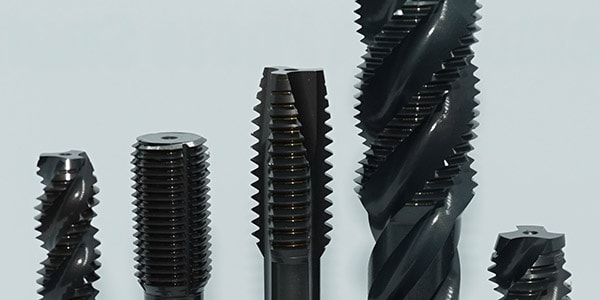At Epic Tool we understand that there are many different types of thread taps with various uses and purpose. On top of that, there are also many different things to look at when selecting the proper tap such as material, volume of holes, coolant supply, rigid or floating holders, as well as the tap material, coating, geometry, etc. With that in mind, we are posting this blog as a guide to help you know when to use each kind of tap!
Straight Flute Taps (Hand Taps)
Hand taps, typically bought at the local hardware store, are the most common types of taps, but they are generally to be avoided for CNC work. The straight flute is the standard style of tap, designed for a range of different common tapping applications.
Spiral Point Taps (Bull Nose Taps)
These thread taps have a spiral cut with relief grooves. They’re common and look like most of the hand taps you’ll see around. However, the spiral angle on the front cutting edges helps eject the chips and the angled edge also gives superior cutting performance. This feature, and the excellent shearing action of the flute, make spiral point taps ideal for production tapping of through holes. In general, they’re really the least expensive thread tap you might consider using for power tapping.
Spiral Flute Taps (Gun Taps)
Spiral Flute Taps have an open spiral just like an endmill. Their primary advantage is they eject chips up and out of the hole. They’re always preferable over spiral point taps when you have a blind hole. They’re also preferable for an interrupted hole where another feature intersects because the spiral helps restart the threading past the open feature. Commonly available in slow spiral (18-30° helix angle) or fast spiral (45-52° helix angle). Following are recommendations for a degree of spiral for various materials:
- High spiral flutes 45° and higher – Effective for very ductile materials like aluminium and copper. If used in other materials, they will usually cause the chips to nest because the spiral is too fast and the chip area is too small for chips to form correctly.
- Spiral flutes 38° – 42° – Recommended for medium to high carbon steels or free machining stainless steels. They form a chip tight enough to easily evacuate. On larger taps, it allows for pitch relief to ease the cutting.
- Spiral flutes 25° – 35° – Recommended for free machining, low or leaded steels, and free machining bronze or brasses. Spiral flute taps used in brass and tough bronzes normally do not perform well because the small broken chip will not flow up the spiral flute well.
- Spiral flutes 5° – 20° – For tougher materials such as some stainless, titanium or high nickel alloys, a slower spiral is recommended. This allows the chips to be pulled slightly upward but does not weaken the cutting edge as much as higher spirals will.
Roll Form Taps (Thread Forming Taps)
Thread Forming taps don’t cut threads at all. The tap is chipless. Threads made this way are often called “rolled” threads. With this process, the metal is pushed out of the way and compressed into position rather than being cut. There are no chips to remove. As a result, the taps themselves are less likely to break and the threads they make are stronger. While many believe roll taps are only good for soft materials like aluminium, they can actually be used on materials up to a hardness of 36 HRC, which is about 340 BHN. That covers a surprisingly wide range of materials including a lot of steels.
For more information about different thread taps, contact the experts at Epic Tool!


